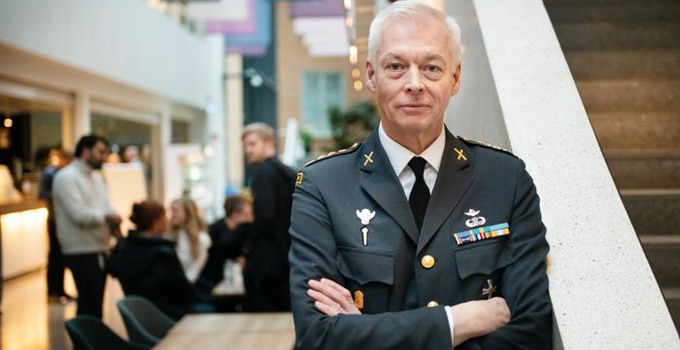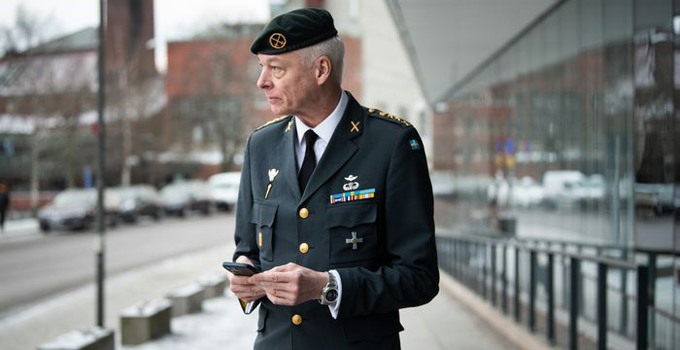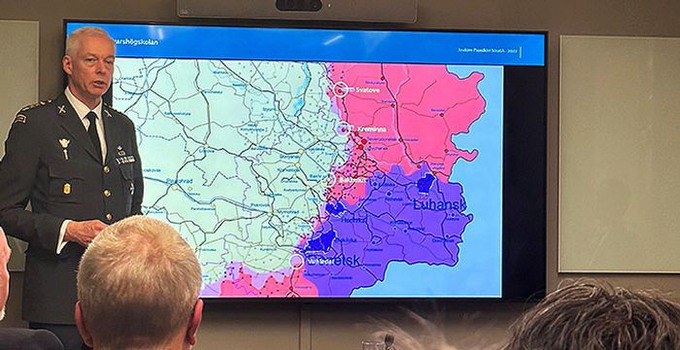
Lieutenant Colonel Joakim Paasikivi, teacher of military strategy. Photo: Anders G Warne.
Confident in the role as a military expert in media
Since Russia's invasion of Ukraine almost a year ago, Joakim Paasikivi has become an indispensable interpreter of both Russia's war of aggression and Ukraine's defence in television, radio and newspapers. He, in turn, keeps himself informed via news media and Twitter.
Joakim Paasikivi has spent the vast majority of his professional life in the Swedish Armed Forces, both at headquarters and at the Military Intelligence and Security Service (Must). He also has several years' experience of service abroad. But the role as an expert in war strategy in the media is new and has, according to him, opened up a new world.
"It's very interesting. I am impressed by how professional they are, those who want to take part in what is called my expertise. They want to do a genuinely good job. And then to meet such great journalists as Lubna El-Shanti, Bengt Norborg and Malcolm Dixelius is fantastic."
"I've previously been extremely skeptical of the media in general, especially when I've worked in organizations that try to avoid the media, such as Must."
Experience inspires confidence
In every interview situation, whether on TV, radio, or in one of the major newspapers, you seem to be genuinely knowledgeable about Russian war strategy. Where does this knowledge come from?
"Throughout the 20th century, Russia was the dimensional enemy. So we looked a lot at the Soviet Union. Not that I was specialized, but the implicit strategy was that we would shoot at the Russians when they would invade us."
"Also, my family history might help a bit."
Joakim Paasikivi is half Estonian and half Finnish-Swedish. That his mother came on a small boat as a refugee from Estonia in 1944, that his great-grandfather Juho Kusti Paasikivi was politically active starting in the Russian era and later became President of Finland for the first ten years of the post-war period, and that his grandfather died at the front during the Continuation War, have of course contributed to his intense focus on the big neighbor to the east.
"But I also think that so much of what we’ve learned in the past about the Soviet Union comes back in any analysis of today’s Russia, so that helps. I also learn from my colleagues when we talk to each other and I read a lot, articles and tweets."
And where does your confidence come from?
"I guess I'm too stupid to be afraid. Jokes aside, I think I know what my area of expertise is, and I know when I have enough knowledge to be able to speculate on a given point. It's not that I just shoot from the hip, I think I have a relatively good military general knowledge."
Have you ever been wrong?
!I've been wrong a lot, but not catastrophically wrong, yet. I've been too optimistic about time a few times, in the sense that I think things will go faster than they do. It's possible that it's a bit too easy to be seduced by the map and not look at the distances properly."
But you haven't said anything that you've regretted afterwards, that you hoped no one noticed?
"No, and everything I have said has been exposed in the media, so there is no risk that it would not have been noticed."
The importance of social media for the analysis as well as the war itself
Much of Joakim Paasikivi's input comes from social media. He has what he calls a "peephole" on Twitter. But he doesn't write anything there himself. However, he sometimes searches for himself to see what is being written about him.
"Sometimes there are some that are positive, but it's a small proportion. However, there is always a long line of detractors who say that I have not been right in anything I have said. But, the detractors never give any examples of my allegedly wrong analyses and that makes me feel somewhat reassured. Because if they can't point to an example where I've been wrong, it's probably worked out pretty well anyway, I think."

Joakim Paasikivi find some information via Twitter. Photo: Anders G Warne.
There is a lot of information available on social media. Journalists, experts and the public as well as Russian and Ukrainian soldiers are tweeting and instagramming about war events and sharing pictures and videos. What are the consequences of us being able, in theory, to follow how the war unfolds in real time?
"There is much more information about this war than any other war in history. In the past, there was usually too little information too late, and it was often wrong."
"Information can still be wrong now, but at least you can't blame it on being too little and too late. The information is there, but it is difficult to interpret, especially for those of us who do not know Russian or Ukrainian. But I still think that by sifting quite heavily - with the inherent problems in mind - the information is very useful."
At the same time, he explains, this is only part of the whole in his analysis, where professional experience can help with a kind of assessment of what’s reasonable, together with what can be read in articles, analyses of think tanks, and other types of media.
"I can use the information that has already been processed, such as the information that the major newspapers have received from their correspondents, to check the accuracy of what I have perceived myself. Of course, I am always behind, for obvious reasons, because I am not dealing with news but with the possible consequences of what is being reported. But when I combine other information, such as translations of Russian telegrams, with what I have myself observed, I can form a reasonable picture."
Information impact a part of the war
The war has been going on for more than a year and both sides are using information operations to influence public opinion. The information that is disseminated and the analyses that are made obviously influence the actions of surrounding countries. How would you say this affects the war?
"It affects the conditions for the war. The Russian information strategy, both towards its own people and externally, is very much about nuclear threats, while I see the Ukrainian strategy being about maximizing arms support and mobilizing the general support of the West."
Many of the researchers and experts that the public has met in the media over the past year work here at the Swedish Defence University. Do you coordinate your analyses with each other?
"No, we do not. Of course we meet each other at work. But I'm not part of any network and I don't want to be, because then it would no longer be my opinion. Even if the discussion itself can be interesting, it is just as problematic as any other information in the sense that everyone makes their own judgments and I can't stand for someone else's judgment, for example on TV."
You have really reached the general public. Even my mother up in Norrbotten talks about Joakim Paasikivi.
"Yes, I have heard that. And I usually say that as an old infantryman, I think at three kilometers per hour, and that seems to work when speaking on TV", he jokes.
"But perhaps this is due to my own dislike of experts who speak in codes and riddles. To some extent, it's easy to fall into jargon and technical language, but it has to be understandable. So I'd rather use terminology that my colleagues find annoying than using a language that the public doesn't understand."

Photo: Anders Modin.
Military teacher at the Swedish Defence University
In 2021, in the midst of the coronavirus pandemic, Joakim Paasikivi started working as a teacher of military strategy at the Swedish National Defence College. Before that, he trained officers from different countries at the international Baltic Defense College in Tartu, Estonia. Do you enjoy teaching?
"Yes, I do, I think I'm decent at it too."
As a military teacher, he holds seminars, mainly with officers in the Senior Officer Program, discussing everything from combat technology to tactics and strategy, nuclear weapons and world trade.
"Our seminars are about discussing and learning from the discussions that arise. It's interesting, especially since the students are professionals with a wide range of experience, so I also learn a lot."
What's next in your professional life?
"I will probably retire. There have been very few occasions in my professional life when I have had a plan, I have been rather lucky. In the last decades of the 20th century, I spent my time training people to shoot holes in cardboard figures, to put it bluntly. And for the majority of the 2000s, I've been on staff and working a bit abroad. The last few years I've been training officers. And it turns out that I've found it quite rewarding all along."
Monika Wallström
In a nutshell
Title: Lieutenant Colonel and teacher of military strategy.
Hobbies: "I like my job, that doesn't mean I don't have a life. But I like my job."
Last book read? "There have not been many books read since February 24, 2022, but when Mick Herron comes out with a new book in the Slough House series (Slow horses) I will read it. It is available as a series on Apple TV plus and I recommend it."
Hidden talent: "If it's hidden, let's keep it that way."
Likes to discuss: "Russia's war of aggression against Ukraine."
Driving force in the job: "I find it so interesting!"
CV in brief
- Military service in Finland with the Swedish-speaking Nylands Brigade and back in Sweden with the Norrland Dragoon Regiment.
- Infantry and cavalry officers' college as one of the first cohort trained in the new chain of command, but quit halfway through because he thought it was "catastrophically bad".
- University for four years with a few extra courses while working as a security guard and subway driver.
- Life Guards from 1986, starting as a volunteer but staying on, including leading an international service as a UN military observer in Angola.
- Headquarters from 2000 in the Strategy Directorate and in Tampa as a liaison officer.
- Management program at the Swedish Defence University 2004-2006.
- Must from 2006 to 2018, including four years as head of the Balkan Division and then the Malian Division for the same length of time.
- Teacher at the Baltic Defense College between 2018 and 2021.
- Lecturer at the Swedish Defence College from 2021.
More about
War StudiesPage information
- Published:
- 2023-03-13
- Last updated:
- 2023-05-09
